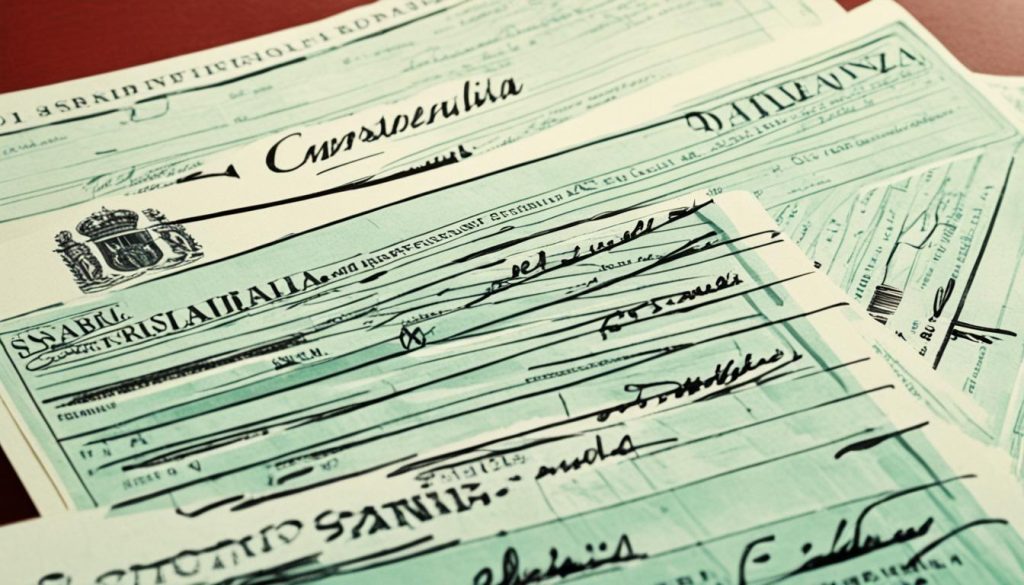When starting a business in Spain, you’ll need to take several vital steps. Opening a Spanish corporate bank account is crucial. It is necessary for both future residents planning to operate businesses long-term and companies under registration. This bank account is key for depositing the minimum share capital. It also makes managing company transactions Spain smooth.
Hiring experts in company formation in Spain brings big benefits. They make opening a corporate bank account easier. They help with the required paperwork and ensure you meet Spanish banking rules.
Key Takeaways
- Opening a business bank account is crucial for company transactions in Spain.
- A Spanish corporate bank account is essential for depositing the minimum share capital.
- Both residents and businesses in the registration process are eligible to open an account.
- Experts in company formation in Spain can facilitate the account setup process.
- Compliance with Spanish banking criteria is necessary.
Why Open a Business Bank Account in Spain?
Opening a business bank account in Spain offers many benefits for businesses. It lets companies manage their money smoothly, every day. Plus, it gives them access to global markets. This helps businesses in Spain grow and stay stable.
Having a business bank account in Spain makes handling money easy. It is important for keeping good financial records. This is great for both residents and international entrepreneurs. It makes Spain a good place for starting a business in Europe.
The Spanish banking sector is efficient and reliable. This is important for economic growth. A good banking system means businesses can manage their money well. This helps them grow in Spain’s competitive market.
A business bank account in Spain gives companies a big advantage. It provides a strong platform for doing business in Spain. This leads to economic stability and growth.
Who Can Open a Business Bank Account in Spain?
Both residents and non-residents can open a business bank account in Spain. This lets foreign entrepreneurs and firms smoothly handle their finances in Spain.
Residents and Non-Residents
Spanish citizens and legal residents have an easy time opening a business bank account. Non-residents, including foreign companies, find the process accessible too. It’s great for international business and smooth money dealings across borders.
Required Documentation
To open a business bank account, certain documents are needed. Legal entities must provide:
- Articles of Association
- Certificate of Incorporation
- Valid passport for natural persons
Non-resident entities and individuals also need a tax ID and proof of address. These steps help ensure everyone follows Spanish banking laws, making banking safe and proper.
Types of Business Bank Accounts Available

Setting up a business in Spain means you need the right bank account. There are many types to choose from, depending on your business activities.
Savings accounts are great for businesses with extra money. They let your funds grow with interest. Plus, they’re flexible and help with cash flow.
Credit accounts let businesses spend more than they have. This is useful for unexpected costs or investment opportunities. Spanish banks offer good rates and flexible payback terms.
Digital current accounts make daily financial tasks easy. They come with online and mobile banking. This means you can handle your finances anywhere. They’re perfect for managing transactions and payroll smoothly.
For businesses with complex needs, Spain has specialised commercial accounts. They offer bespoke features like bulk payments and multi-currency options. They also provide managers to help your business thrive.
- Convenience in managing cash flow
- Access to funds during financial exigencies
- Enhanced features for digital transactions
- Customised solutions for corporate needs
Knowing the different types of business accounts helps. Choose the right one to meet your financial goals and operations.
Choosing the Right Bank for Your Business Needs
Deciding on a business bank account in Spain means weighing your options. You can choose between Spanish private banks or state banks. Each kind comes with its own benefits suited to different business needs. This choice will largely shape your financial handling.
Private vs. State-Owned Banks
Picking between private and state-owned banks means looking at what each offers. Private banks, like Banco Santander and BBVA, aim at corporate clients. They offer tailored services to meet business demands. You will find advanced technology, new financial products, and personalised help here.
On the flip side, state banks like Banco de España may bring more stability. They might also have more consistent fees. For new and small businesses, this could be a better fit.
Assessing Bank Services and Fees
When you’re selecting a bank, it’s vital to examine their services and fees carefully. The costs associated with Spanish private and state banks vary greatly. You should look specifically at:
- ATM withdrawal fees
- Yearly account maintenance fees
- Transfer costs
These fees affect how smoothly your financial management goes. By comparing what different banks offer, you can choose the best one for your business’s money health. Taking time to assess amenities and fee schedules is crucial for a wise decision.
Formalities for Opening a Business Bank Account
Starting a business bank account in Spain means you have to follow some steps. First, you need to register your trading name. This makes sure your business is legally recognised. After registering, you must learn about Spain’s rules for business bank accounts.
You’ll need various documents like a valid ID, proof of address, and business registration papers. Getting a tax ID is also key to follow Spain’s tax laws.
Getting help from consultants or notaries can make things easier. They can guide you through the process smoothly. By being careful with these steps, opening your business account in Spain will be straightforward.
- Complete trading name registration
- Understand and follow corporate bank account procedures Spain mandates
- Gather necessary personal and company documents
- Apply for a tax identification number
- Seek assistance from consultants or public notaries
Documents Needed for Company Formation

When starting a business in Spain, having all necessary incorporation documents Spain is key. This makes sure the setup goes smoothly, letting your business start quickly. It’s important to gather all required documents beforehand.
Articles of Association
The Articles of Association are essential for your statutory company documentation. They set the rules for how the company operates. They also detail the company’s objectives, its shareholder framework, and how it’s managed internally. These articles are vital among the incorporation documents Spain.
Certificate of Incorporation
The Certificate of Incorporation is a crucial document. It officially shows your company exists and meets legal standards. It includes the company’s name, its registration number, and when it was formed.
Be ready with other key statutory company documentation too. This includes tax authority documentation and a bank certificate for the share capital deposit. Having these documents ready ensures a smooth start in Spain.
Steps in Setting Up a Business Bank Account
Starting a business bank account in Spain means taking several steps for a smooth start. Knowing how to open an account there is vital for your business’s success.
-
Select an Appropriate Commercial Bank: First, look into different banks in Spain to find one that suits your business. Consider their services, fees, and what other customers say to choose wisely.
-
Prepare Necessary Personal and Statutory Documents: Collect all needed documents, like your passport and proof of address. You’ll also need your business’s Articles of Association and Certificate of Incorporation. Make sure everything is current and notarised if needed.
-
Apply for a Foreigner Tax Identification Number (NIE): Getting an NIE is a must for non-residents opening a business account in Spain. This number is key for business deals and handling taxes.
-
Deposit Required Capital: You must put in the minimum required capital as per Spanish law. This is a key step to open your business bank account and get a certificate from the bank.
-
Obtain Bank Certificate: After depositing the capital, the bank will give you a certificate. This proves the deposit and is needed to finish setting up your business.
Depositing Minimum Share Capital
Depositing the minimum share capital is key when you start your business in Spain. This is especially true if you’re setting up a limited liability company. The required amount changes depending on your business type. For a limited liability company, it’s vital to have the minimum share. capital requirement met for registration.
To establish your business, you need to put the necessary share capital in its bank account. This step is proven through a bank certificate. It confirms your capital deposit. This document is crucial for the next steps in forming your limited liability company in Spain.
Meeting the minimum share capital requirement shows your business is financially prepared. It’s an important step for a strong start. Complete this step carefully to ensure no delays in your business’s setup and future actions.
Advantages of Having a Local IBAN

For international businesses in Spain, having a local Spanish IBAN is key. It helps in making payments and transfers smooth. This gives businesses a solid edge in local banking.
Streamlined Payments and Transfers
A Spain IBAN eases international business payments. It allows easy sending, receiving, and converting of large amounts. This means money moves quickly and efficiently, both in and out of Spain. Businesses enjoy lower fees and quicker processing times. It’s perfect for global companies.
Access to Local Banking Services
Having a Spain IBAN means constant access to local banks. This is great for everyday money management. You get cheaper domestic transfers, easier transactions with local businesses, and full integration with Spanish financial systems. It simplifies business operations and boosts efficiency in Spain.
Maintaining Your Business Account
Effective business account maintenance in Spain needs you to watch and handle banking activities closely. It’s vital to follow financial rules in Spain for your business to run smoothly. Also, keep an eye on changes in the Spanish banking system, as they might affect how you manage your finances.
Here are key steps to take care of your business account:
- Regular Monitoring: Often look at your account statements and transactions. This helps spot errors and manage cash flow well.
- Compliance with Regulations: Make sure your business meets Spain’s financial laws. This means doing necessary filings and keeping accurate records.
- Update Information: Always keep your account and contact details current. This avoids issues with your banking services.
Also, think about using modern banking tools and technology in Spain. Tools like automated alerts help keep you up to date on account activity and banking rules. By looking after your business account well, you create a smooth financial process. This lets you focus on expanding your business.
Online Account Management
Managing business finances in Spain is now easy, all thanks to digital banking. Spanish bank mobile apps let businesses check their accounts anytime. They can look at transactions, keep an eye on balances, and handle banking tasks whenever needed.
Digital transactions are smooth with these apps. Businesses can transfer money, pay for services, or sort out salaries easily. This makes work easier and fits into any schedule, even outside regular bank hours.
These apps are user-friendly. They make it simple to manage money tasks. Business owners get alerts for their account activities, so they never miss out. Plus, these apps have strong security to keep money safe.
Digital banking in Spain is essential for businesses today. It lets companies be quick and make smart money choices fast. This is key for staying ahead in the market.
Important Considerations for Foreign Investors

If you’re thinking about investing in Spain, knowing the local laws and taxes is key. When you set up and handle a business bank account, this knowledge is vital. Learning about financial legislation and your tax responsibilities for businesses helps everything run smoothly and keeps you compliant.
Understanding Local Laws
Getting to know Spanish financial laws is a must for investors. You should learn the legal rules for different business types. Following these laws is important to avoid trouble and make sure your investment grows well in Spain.
Tax Implications
Understanding tax responsibilities for businesses is crucial when you start a business in Spain. Spain’s tax system is special and affects how much profit you can make. Knowing these rules is important to keep your business doing well and legal in Spain’s economy.
Common Challenges and How to Overcome Them
Setting up a business bank account in Spain comes with its challenges. One major issue is the pile of paperwork needed. It’s vital to know what documents are necessary well in advance. This preparation helps speed up the process.
Businesses should get all their documents ready. Important ones include the Articles of Association and Certificate of Incorporation. This makes the whole account opening smoother.
- Comprehending Banking Fees: Figuring out banking fees is another hurdle. It’s smart for businesses to look into and compare the costs. This helps them find an account that saves money.
- Language Barriers: The language difference can be tough for those who don’t speak Spanish. Using translation help or finding someone bilingual eases this challenge. Luckily, many Spanish banks now offer services in English.
Getting professional advice can be a game-changer in overcoming banking hurdles. Experts who know about Spain’s financial system can offer great insight. They help make opening a business bank account much less complicated.
How Professional Services Can Help
Getting a business bank account in Spain set up is easier with professional help. They guide you through every step, ensuring you meet Spanish standards.
Company formation experts handle everything smoothly. They gather and submit all needed documents correctly, avoiding delays. Plus, they provide translation services to bridge any language gaps for foreign entrepreneurs.
Following Spanish banking rules is crucial for these experts. They know the local laws well, preventing issues before they happen. This lets you concentrate on your business.
Business Bank Account Fees in Spain
For businesses in Spain, knowing about bank fees is key. Extra charges can really affect a company’s profits. Being smart about the fees for banking in Spain is crucial.
The fees for a corporate account can vary. Just keeping an account open might cost from EUR 20 a year. And doing things like international transfers adds more fees.
Think about the costs for using debit or credit cards too, which depend on your bank and card type. Also, some banks charge for services like payroll management, merchant services, and dealing in different currencies.
To keep costs low, it’s wise to do your homework and talk to banking experts. Finding a bank with low fees and good services can help your business stay financially healthy.
A Business Bank Account is Key When Setting Up in Spain
Starting your financial journey in Spain? Opening a business bank account is crucial. It helps in keeping your business organized by combining all setup needs into one system. A business bank account is key for keeping share capital, making transactions, and handling daily finances as per Spanish regulations.
Having a business bank account makes it easier to manage money coming in and going out. It ensures payments are smooth and helps in managing finances well. Plus, it offers access to services that fit your business’s unique needs.
Also, picking the right bank adds extra value to your business. It gives you features like online account management, effortless international transfers, and local support. This creates a strong base for your business, making your financial journey in Spain legal and efficient.
Conclusion
In our detailed overview of Spanish business banking, we’ve learned that getting a business bank account is essential. It offers many benefits, such as better financial management and meeting Spain’s legal requirements. The process may look complex at first glance.
Yet, with careful research and smart choices, finding the right bank for your business is achievable. Our summary highlights the need to understand different account types and required documents. It doesn’t matter if you live in Spain or not. Clear guidance can help make the process easier for everyone.
Remember to keep your account in good shape and use online tools for more effective management.
The value of professional services in Spanish business banking cannot be overstated. These experts can guide you through Spain’s banking system, offering crucial advice. Keep in mind, choosing the right business bank account is key to your venture’s financial health and legal standing in Spain.














